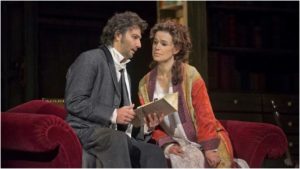
Opera Profile: Massenet’s ‘Werther’
By Logan MartellPremiering on February 16, 1892, at the Vienna State Opera, “Werther” is adapted from the novel “The Sorrows of Young Werther,” written by Johann Wolfgang von Goethe. Although the work would be later staged at the Opera-Comique in Paris, it was first rejected due to its serious tone and sullen protagonist. It wasn’t until the success of “Manon” that Massenet would be able to present “Werther” to audiences in Germany, and eventually, the rest of the world.
Short Plot Summary
The opera begins in summer; a bailiff is teaching six of his children a Christmas carol. Charlotte, his eldest daughter, is readying herself to go to a ball. Her fiancé Albert has been gone for several months, so the task of escorting Charlotte falls to young Werther, who is noted to be dreary. Shortly after the two leave, Albert returns from his long trip. Charlotte’s sister, Sophie, explains to Albert where she has gone for the evening; Albert departs but assures the family he will return in the morning to see Charlotte. By the time Werther and Charlotte return home, the young poet has fallen in love with her. Before he can articulate these feelings to Charlotte, she is told about Albert’s return. Werther falls into despair upon learning that Charlotte has promised her dying mother that she would marry Albert.
Charlotte and Albert marry sometime over the next three months. Neither Albert nor Sophie can do anything to console Werther. When he speaks with Charlotte about the day they met, she implores him to leave, but opens the possibility of him visiting on Christmas Day. Seeing how devastated Werther is, now contemplating suicide, Albert comes to realize that he is in love with Charlotte. On Christmas Day, Charlotte is alone as she reads the letters Werther had sent to her. Werther himself soon arrives and reads to her poems by Ossian, during which he learns of her mutual love for him. Despite this, Charlotte again begs Werther to leave, greatly upsetting them both. After Albert returns, he receives a message from Werther requesting to borrow pistols, under the pretense that he is going on a hunting trip. Overcome with worry, Charlotte runs off to find Werther at his apartment, only to arrive too late. Now dying from his gunshot wound, Werther begs for forgiveness, which Charlotte gives along with her own declaration of love. As the life fades from Werther, children outside sing a Christmas carol.
Famous Musical Numbers
The tenor’s “Pourquoi me reveiller” is a noted aria that gets presented outside of the context of the opera. Charlotte’s letter scene at the top of the third act is also a concert favorite for some mezzo-sopranos.
Watch and Listen
Here is one of the most celebrated interpretations of recent times, featuring Jonas Kaufmann and Sophie Koch in the lead role.
Categories
Opera Wiki

